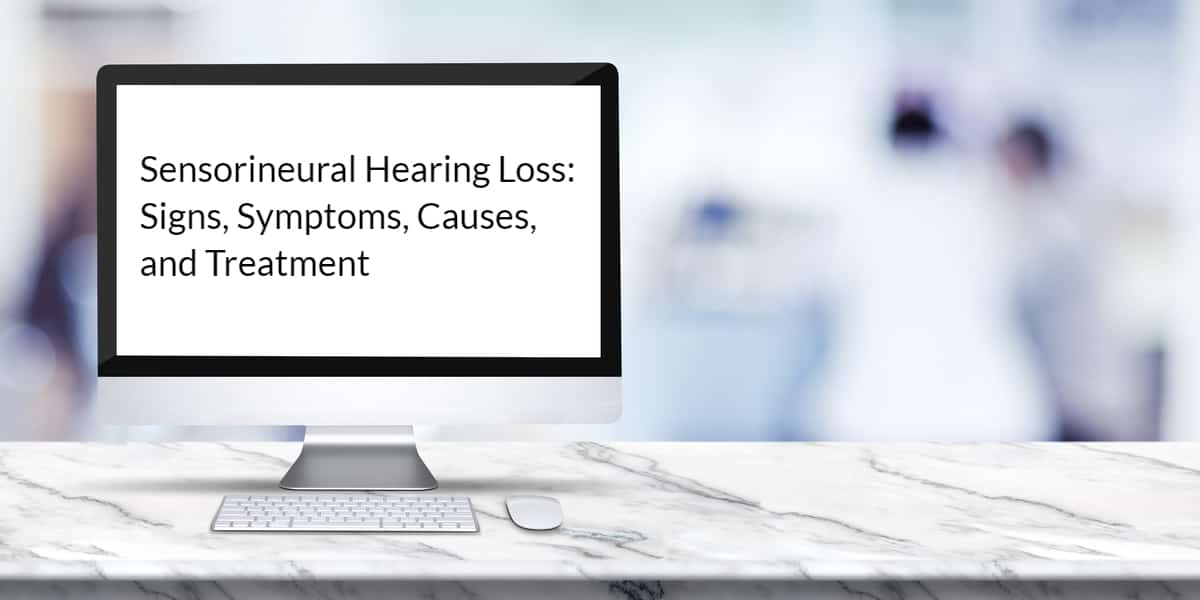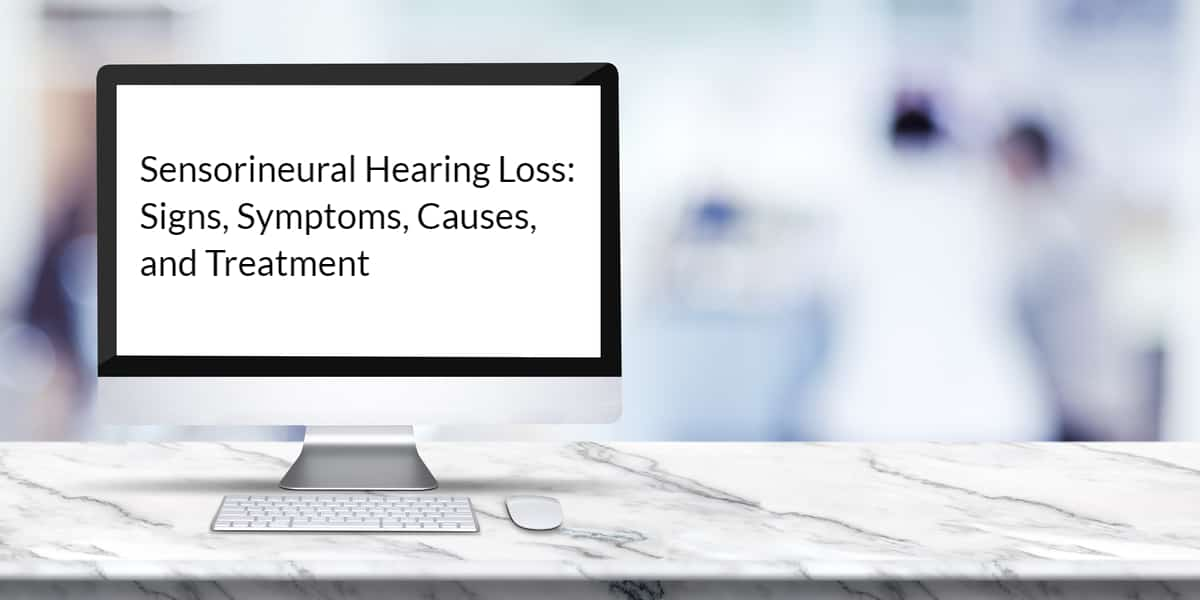Sensorineural Hearing Loss: Signs, Symptoms, Causes, and Treatment
March 3rd, 2021 | 5 min. read
By Admin


Sensorineural hearing loss causes over 90% of adult hearing loss. It's due to issues of your inner ear, also called nerve-related hearing loss.
What Is Sensorineural Hearing Loss?
Inside your inner ears, you have tiny hair cells. They’re responsible for detecting sound. Your hearing nerve then goes on to transmit this sound to your brain. When the hair cells are damaged by either sound, age, or disease, it can lead to Sensorineural hearing loss. You can experience Sensorineural hearing loss in one or both ears.
You can be born with Sensorineural hearing loss, however, you're more likely to develop it over time. Presbycusis (age-related loss of hearing) is one of the most common Sensorineural hearing loss causes. The loss of hearing can vary from mild to severe and can even be profound. It often becomes worse gradually over time, depending on what's causing it.
What Is Sudden Sensorineural Hearing Loss?
Sudden Sensorineural hearing loss, often referred to as sudden deafness, is a rapid hearing loss you can't explain that occurs over a few days or all at once. It occurs because there's something wrong with the inner ear's sensory organs. Sudden Sensorineural hearing loss often impacts just one ear.
Individuals with sudden Sensorineural hearing loss frequently find the loss of hearing upon waking up in the morning. Others first notice it after attempting to use their deafened ear, like when using a phone. And, others notice an alarming, loud "pop, right before they lose their hearing. They might also notice symptoms like:
- Dizziness
- A feeling of fullness in their ear
- Tinnitus or ringing in their ears
In some cases, individuals with sudden Sensorineural hearing loss put off seeing their physician because they believe their loss of hearing is due to a sinus infection, allergies, a buildup of earwax, or something else. But, sudden Sensorineural hearing loss should be treated as an emergency, and you should immediately see your doctor.
While around half of individuals with this condition spontaneously recover some or all of their hearing, typically within a week or two from when it first occurred, delaying diagnosis and treatment could reduce the effectiveness of the treatment. Receiving treatment in a timely manner can greatly increase your chances of recovering at least some of your hearing.
According to experts, sudden Sensorineural hearing loss develops in between one and six individuals per 5,000 each year, but there could be a higher number of new sudden Sensorineural hearing loss cases since it often goes undiagnosed. It can occur in individuals of any age, but typically impacts adults in their late 40s to early 50s.
Request an Appointment Today for Sensorineural Hearing Loss
How Does Sensorineural Hearing Loss Differ from Conductive Hearing Loss?
Damage to your inner ear structures or auditory nerve can lead to Sensorineural hearing loss. This form of hearing loss results in issues turning sound vibrations into neural signals the brain is able to interpret.
Conductive hearing loss happens when sound isn't able to pass through your middle or outer ear. Conductive hearing loss can occur due to the following:
- Ear infections
- Fluid buildup
- Earwax
- Hole in your eardrum
- Deformations in your middle or outer ear
- Foreign object obstruction
- Benign tumors
Both forms of hearing loss could cause the same symptoms. But, individuals with conductive hearing loss frequently hear muffled sounds while individuals with Sensorineural hearing loss hear distorted and muffled sounds.
Some individuals experience a combination of both conductive and sensorineural hearing loss. Hearing loss is said to be mixed if there are issues both before and following the cochlea.
It's essential to obtain a proper diagnosis if you're struggling with hearing loss. Sometimes it's possible to get your hearing back. The faster you receive treatment, the likelier you are to reduce damage to your ear structures.
Signs & Symptoms of Sensorineural Hearing Loss
Frequently, loss of hearing occurs slowly over time. This is why it's a good idea to know the Sensorineural hearing loss signs so you'll know what it feels like if you experience it.
It can be hard to identify the symptoms specific to just Sensorineural hearing loss. But, if you do experience any of the following symptoms, chances are good you're suffering from hearing loss, and likely, Sensorineural hearing loss.
Symptoms of Sensorineural Hearing Loss might include:
- It's hard to follow conversations that involve more than two individuals or when there's noise in the background.
- People sound like they're mumbling or sounds seem unclear.
- Difficulty understanding public verbal information like on loudspeakers, at work, in stores, or in restaurants.
- Buzzing or ringing in your ears (tinnitus) is common with Sensorineural hearing loss.
- Hard time hearing high-pitched sounds.
- Hard time understanding phone conversations.
If you notice any of these signs above, you may be suffering from loss of hearing. You might even be experiencing more than one sign, and this is normal. It's important you see your doctor who will likely refer you to a specialist for a professional assessment.
Causes of Sensorineural Hearing Loss
Sensorineural Hearing Loss can be congenital, which means it's acquired or present at birth. The following are possible causes of Sensorineural Hearing Loss:
1. Congenital
When the hearing loss is present at birth, it's known as congenital and is a common birth abnormality. It affects around one to three newborns per 1,000 births.
Around 50% of kids born with congenital hearing loss, developed it from genetic factors. The other 50% develop it from environmental factors. Over 100 genes are associated with genetic hearing loss. A lack of oxygen and infections could also lead to hearing loss.
2. Presbycusis
Presbycusis is age-related hearing loss. Around one in three individuals between 65 years old and 74 in the U.s. have hearing loss. Around half have some form of hearing loss by the age of 75.
3. Loud Noises
Being exposed to noises over 85 decibels could cause Sensorineural Hearing Loss. Even being exposed one time to sounds like explosions or gunshots could cause permanent hearing damage.
Diagnosing Sensorineural Hearing Loss
Physicians use a few types of tests to diagnose Sensorineural Hearing Loss properly.
1. Physical Exam
Physical exams can help the doctor differentiate Sensorineural Hearing Loss from conductive hearing loss. They'll look for things like:
- Inflammation
- Eardrum damage
- Earwax buildup or fluid
- Foreign bodies
2. Tuning Forks
The physician might use a tuning fork test in an initial screening process. Certain tests include:
- Rinne test: The physician will strike the tuning fork and place it behind your ear against your mastoid bone until you don't hear the sound any longer. They'll then move the tuning fork to the front of your ear canal and hold it there until you no longer can hear the sound.
- Weber's test: The doctor will strike a 512 Hz tuning fork gently and place it near your forehead's midline. If you hear the sound louder in your impacted ear, you likely struggle with conductive hearing loss. If you hear the sound louder in your ear that's not affected, the hearing loss is probably sensorineural.
3. Audiogram
If the doctor believes you're struggling with hearing loss, they'll likely send you to an audiologist for a more precise audiometer test.
During the test, you'll sit in a soundproof booth and wear headphones. Words and tones will be played in both of your ears at different frequencies and volumes. This test assists in finding the quietest noise you can hear and certain frequencies of hearing loss.
Sensorineural Hearing Loss Treatment Options
There isn't any surgical treatment for Sensorineural Hearing Loss at the moment. The most common option is cochlear implants and hearing aids which help compensate for your hearing loss. Hearing loss gene therapy is an expanding research field. But, it's not used clinically for Sensorineural Hearing Loss at this time.
Hearing Aids
Hearing aids today can match certain symptoms of hearing loss. For instance, if you have issues with high-frequency noises, a hearing aid could help dial these sounds in without impacting other frequencies.
Cochlear Implants
Cochlear implants are devices that could be surgically implemented for helping with severe Sensorineural Hearing Loss. Cochlear implants have two parts - a microphone that's placed behind your ear and the receiver you wear inside your ear that will send electrical information to your auditory nerve.
Contact Houston Hearing Center
Here at Houston Hearing Center, we've been helping patients of various ages hear better for over 100 years. Our audiologists work together with doctors at Houston Ear, Nose, Throat & Allergy to offer outstanding hearing and balance care with treatment plans individualized for each patient. This multidisciplinary approach will mean you'll seamlessly receive both audiological and medical care. Contact us today to set up your appointment.
Lorem ipsum dolor sit amet, consectetur adipiscing elit, sed do eiusmod tempor incididunt ut labore et dolore magna aliqua. Sed risus ultricies tristique nulla aliquet enim.
Topics: